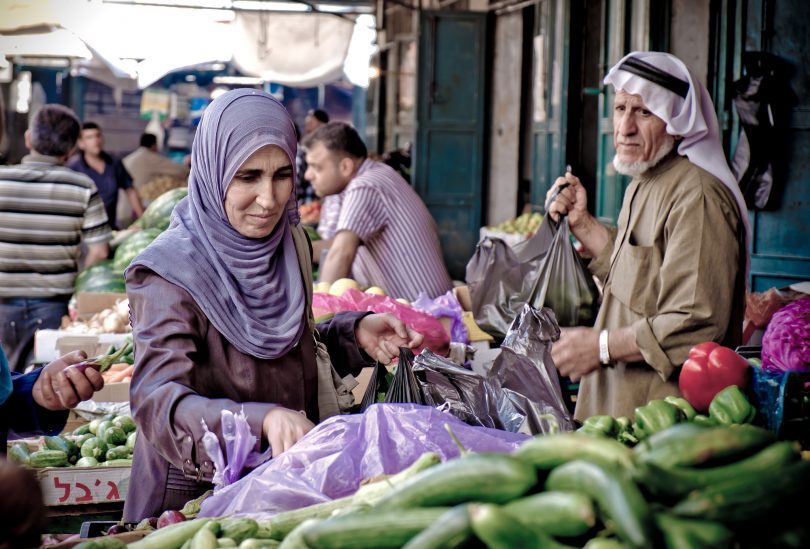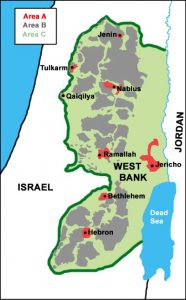People who work in development understand that the private sector plays a critical role in economic development. But understanding – and taking advantage of – market opportunities is not simple in the most functional of markets, so what about markets in conflict-affected areas?
I recently visited the Palestinian Territories to learn about CARE’s approach there. Before this visit, I had never been to the Middle East. I was expecting complexity, but I hadn’t appreciated how incredibly difficult living in the West Bank is, let along trying to run a business there.
The 1995 Oslo Agreement split the West Bank into three Areas, A, B, and C, with different security and administrative arrangements. Area A is administered (civil and security issues) by the Palestinian Authority; Area B is administered by both the Palestinian Authority (civil issues) and Israel (security issues); and Area C, which contains the Israeli settlements, is administered by Israel (civil and security issues). All areas surrounding Areas A and B are defined as Area C. Area C is about 60% of the West Bank territory and includes 65% of natural resources, but Palestinian use of this area is restricted. This results in disjointed ‘islands’ of Palestinian communities spread across the West Bank. While the arrangements governing these areas are highly complex, for now it’s enough to appreciate that the movement of people and goods between these areas is tightly controlled and very unpredictable.
With the support of the Australian Government’s ‘Australia Middle East NGO Cooperation Agreement’ (AMENCA), CARE is seeking to improve the livelihoods of small farmers by improving agribusiness and market access in the West Bank.
There are so many factors working against these farmers. Costs are imposed by restrictions on exports and imports, which results in unavailability of quality inputs leading to higher production costs. The import of some goods that can assist agricultural production, such as specific types of fertilisers and pesticides, are prohibited because they have a dual usage – they can potentially be used for both civilian and military purposes.
There are also costs associated with barriers to the movement of goods and people within the West Bank. A Palestinian farmer may live in Area A but farm on land in Area C. Crossing points are often closed, preventing access to fields. Worse still, it may prevent harvesting or getting produce to markets. When your livelihood is dependent on these activities, as is the case for the strawberry farmers that I met, timing is critical.
And there is the destruction of productive assets and forced displacement of people as a result of conflict.
All businesses, wherever they are, need to be able to plan. Virtually every Palestinian farmer and business person I met told me that the environment is so unpredictable that any long-term planning is virtually meaningless.
So in an environment where it would be easy to conclude there is no hope, I was amazed to learn what is being achieved. Australian funding is helping to identify market constraints and opportunities, and then to facilitate market responses.
A seed bank, established in 2006 originally as a mechanism to facilitate the access to better seed varieties to improve food security, has grown into a large enterprise, supporting more than 2500 farmers, and in 2017 is filling major supply contracts with local and exporting companies.
Supporting an existing community-led milk collection unit has expanded the market for dairy farmers to sell milk collectively, allowing for commercial sheep and goat dairy production. The aggregation unit is now filling contracts with national production companies – starting from 500 litres/day. There are now six other collection hubs that will join the network.
During my visit a major investment company advised that it had just approved a significant investment to establish an agribusiness based on a business case prepared by CARE. The specifics are still under development, but I’m looking forward to an announcement in the coming months.
These are impressive results, so what is the CARE team and partners in the Palestinian Territories doing right?
- Check your development philosophy. The CARE team was ‘fed-up’ with the dependence culture that a purely humanitarian approach engenders in a protracted crisis. They wanted to quickly and appropriately bridge ‘humanitarian’ support with longer-term ‘development’ interventions. Thinking about a transitional approach that builds resilience helped to identify a range of creative interventions.
- Do the analysis. CARE took a lot of time to do value chain research and analysis. We needed to work out: what the most suitable products were; each step in the production of those products through to value-added/processed end product; who the players at each stage were; and where the constraints and opportunities were. There was an explicit assessment of the role of women in the value chain and their control of resources and decisions. This helped to identify and back the local capacity that already existed.
- Be pragmatic. The CARE team talk about applying a ’hybrid market systems approach’. This just meant that they recognised that different constraints or opportunities required different approaches. The business case mentioned above is an example where a small nudge was all that was required. But the dairy cold chain required a deeper role of supporting the necessary cold chain infrastructure and helping to broker the relations with small-scale farmers, community cooperatives and national companies.
- Be willing to learn and adapt. In the search for innovation, I’ve heard people suggest that it’s necessary to ‘fail-fast’. I prefer the ‘fail-small’ perspective. In such a difficult operating environment, not everything works as planned. Many of the successes have been built over a number of years, building on set-backs but also building resilience. The Australian Government has supported three iterations of the AMENCA program over the last decade. This long-term contribution has been critical. Many of the impacts are built on the continued engagement and support of the Australian Government.
My visit reinforced how desperate the situation is for many Palestinian communities. It’s always inspiring to see the resilience of people who are dealing with circumstances we can barely contemplate in Australia. That human spirit didn’t surprise me, but I was surprised that even in a conflict-affected environment, markets exist and that supporting those markets is just as important as providing humanitarian support.
Paul Kelly is Principal Executive, International Programs at CARE Australia.




Leave a Comment